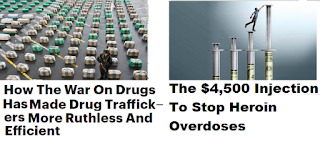...Are Related.
You may not fully appreciate this, but the fact is that a big part of why we continue the war on drugs is that it has become a big business. There is also, of course, the fact that the war itself has been an immensely cost burdened mistake. A mistake that has obviously not stopped the drugs from coming in.
On the other side of things we have the whole nature of the Pharmaceutical Industry. If there is a way to squeeze more profit out of a drug you can bet they will take advantage of it. And one of the casualties in that little conundrum is the fact that the drug we have now to stop overdoses in their tracks is also becoming more and more expensive.
Before I go any further here I do want to be clear on one thing: A big part of the problem is the very poor choices so many of us make. And believe me, I've not only seen it first hand, I've lived it myself. A "benefit" of having grown up with parents who were both alcoholics, and whose relatives were as well. The effects of drug addiction, both alcohol and the other usual suspects, are something I understand quite viscerally. That having been said, however doesn't change the fact that I still believe that choices must have consequences. It also doesn't change the fact that, though Capitalism isn't to blame for all of these ills, it certainly has a far too big a stake in them for anybody to just ignore.
I make that preface because of two propositions I have been quite firm on over the years. One is the fact that, if you could take the money out of drugs you would eliminate a big part of the incentive to produce them in the first place. And secondly, even without that incentive in place, people are going to want to get high no matter what economic system you have in place.
So. The bottom line here for me has always been this.Whether we stay with Capitalism or not (though we certainly should get rid of if), we must stop the war on drugs. Absolutely and without question. What we should do in its place, at least in a broad stroke kind of view, is this:
All drugs must be made not only legal, but cost free. And we do this by the maintenance of a two tiered dispensary system. The first tier would be a pay to stay affair, run by third parties, who charge not for the drugs themselves, but for a more pleasant atmosphere to take them in. The second tier would be basic accommodations at the most fundamental level: clean, sheltered, and private to be sure, but with no frills whatsoever.
The idea here would be that you could take whatever drug you desired (excepting the not so dangerous ones, like Pot, and maybe alcohol), but with the understanding that you can't leave until the drug has left your system. And if you are so completely addicted you keep dosing to the point that you overdose, then this is what will happen: Three strikes and you're out. The first two times you will be saved, and you will be strongly encouraged to seek treatment; treatment we might actually be able to afford now that we're not paying for another useless war, by the way. But if you continue to refuse this treatment then you will simply be allowed to die. And I say that last part with a conviction that comes not only from our battles with addiction, but also from our ambivalence on whether people have a right to choose when they want do die.
In both cases here choice is the most important aspect; both in the understanding that you need to take responsibility for your choices, but that, in a free society, personal choice has to be of immense importance for the society as a whole to protect.
Think about these things. Find a way to take action and do something about it.
EFFECT AND CAUSE
How The War On Drugs Has Made Drug Traffickers More Ruthless And Efficient
Evolution could have predicted the failure of the war on drugs.
SHOOTING UP PRICES
The $4,500 Injection To Stop Heroin Overdoses
Kaleo, a privately-held pharmaceutical firm, has an antidote for the opioid epidemic — but its fast-rising price is putting it out of reach.
See Also:


No comments:
Post a Comment